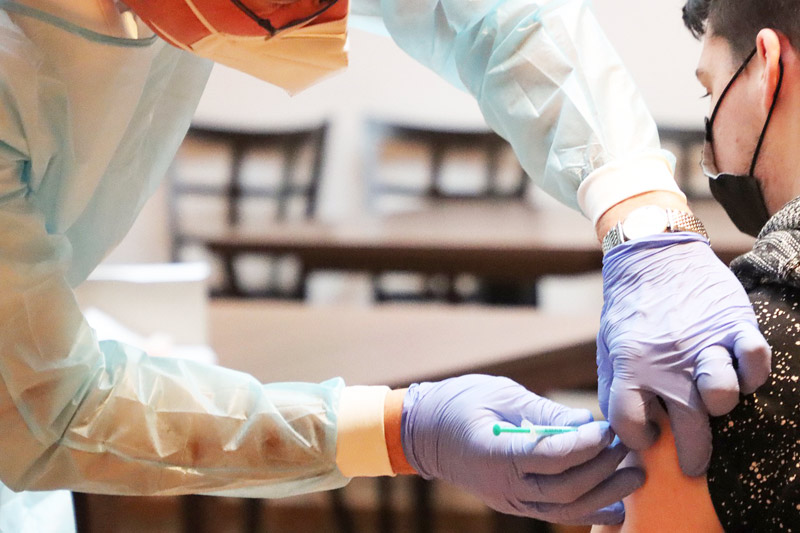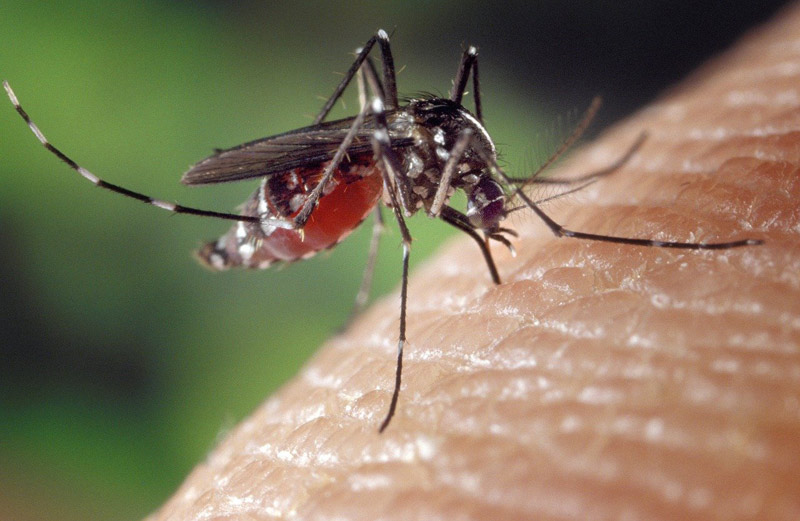Travellers to Tanzania need to ensure that they have received all the necessary vaccinations before they embark on their trip.
As a country that has relatively few major towns where comprehensive medical care can be sought, it is imperative that you take the necessary actions beforehand to prevent serious illness.
I travel frequently to Tanzania for business and pleasure.
With each trip, I always ensure that I follow my doctor's guidelines and the Tanzanian government's regulations to the letter when it comes to vaccinations and other important health checks.
This article can be used as a guide for those necessary vaccinations, but your local doctor or travel clinic will be able to inform you better of which vaccinations are required before you travel to Tanzania.
Please note: The list of required vaccinations in this article is for your information and should not be used for the treatment or diagnosis of ailments.
The vaccines listed below are what is currently recommended by the Centers for Disease Control and Prevention, and further information can be found on their website.
My Quick Takeaways:
Planning a trip to Tanzania? Here’s what you need to know about Tanzania vaccination requirements:
- Yellow Fever: A vaccination certificate is required if you're arriving from, or have transited through, a country with a risk of yellow fever transmission.
- Routine Vaccinations: Ensure you're up to date with standard immunisations, including measles, mumps, rubella (MMR), diphtheria, tetanus, and polio.
Recommended Vaccinations:
- Hepatitis A and B: Advised for most travellers due to potential exposure through food, water, or medical procedures.
- Typhoid: Especially important if you're visiting smaller cities or rural areas.
- Rabies: Consider if you'll be in close contact with animals or in remote areas without quick access to medical care.
- Meningococcal Meningitis: Recommended during the dry season (December to June) or if you'll be in close contact with local communities.
- Malaria Prevention: Tanzania is a high-risk area for malaria. It's essential to take prophylactic medication and use protective measures like insect repellent, mosquito nets, and wearing long-sleeved clothing in the evenings.
Ready for a full breakdown on Tanzania's vaccination requirements? Let's get into it.
Tanzania Vaccination Requirements
Tanzania has stringent vaccination requirements to counter viruses and diseases related to contact with mosquitoes, rabid animals, exposure to contaminated water or compromised immune systems.
Please read on for details about different viruses and diseases you can potentially contract in Tanzania and vaccination protocols.

Malaria
Risks
Tanzania is considered a very high-risk malaria area. The areas with the greatest risk are places near the coast, but inland towns such as Arusha and Moshi are not averse.
The regions above 2000m in altitude do not have the anopheles mosquito, which transmits malaria. This means trekkers tackling Kilimanjaro are most at risk before and after the expedition, not during.
Precautions
The anopheles mosquito is most active at night. It is vitally important to reduce exposure risk to mosquito bites as follows:
- Use deet insect repellent and apply it to your bedding, clothes, and skin.
- Stay indoors as far as possible between dusk and dawn.
- Insect-proof your sleeping area with a mosquito net.
- Wear long, loose, light coloured clothing.
- Use a fan or air conditioning if possible.
See more info on what necessities to pack for a trip to Tanzania.
In addition to the above measures, it is recommended to go on a course of anti-malaria medication or prophylaxis. Multiple options are available, so visiting your local GP will help to narrow down your options.

Plan your Safari experience
Check out these amazing deals on epic safari experiences now.
Something to consider is that different areas have strains of malaria with drug-resistant properties towards some of the established medications.
The following people should be advised to exercise extreme caution when travelling to high-risk malaria areas:
- pregnant women
- young children under five years old
- immunocompromised individuals (for example HIV infection with a CD4 under 250)
- chemotherapy patients
- splenectomised individuals
- Many health resource organisations suggest that these people do not travel to high-risk malaria areas at all.

Malaria Prevention Medications
The three major chemoprophylaxis regimens are:
- Doxycycline, which is started 24 to 48 hours before entering the area and is continued for 30 days after leaving it. It is contraindicated in pregnant people, people taking oral contraceptives and children under 11 years old. It is a cost-effective option and is highly efficacious.
- Mefloquine is contraindicated in psychiatric illness, infants under 5kg and people with cardiac arrhythmias. It is started a week before entry into the country and continued until four weeks after exit. The major benefits are for long term travelers.
- The last option is Atovaquone-Proguanil. It is good for short-term travelers as it is started 24 to 48 hours before entering the area and continued for only seven days afterwards. It is contraindicated in people with renal impairment and children under 11kg.
Other options also exist but it is best to contact your local doctor, especially if you have specific concerns or worries, and to find out more about potential side effects.

Routine Tanzania Vaccination Requirements
These are the vaccinations most people should have received in the first few years of life, but may also receive later on in life:
- Chickenpox (Varicella)
- Diptheria-Tetanus-Pertussis
- Flu (Influenza)
- Measles-mumps-rubella
- Polio
- Shingles
Please note: Make sure you are up to date will all routine vaccinations before each trip to Tanzania. If you are unsure, be sure to ask your doctor or any relevant medical professional beforehand for more information.
You may also have to get vaccines for these viruses and diseases before a trip to Tanzania:
- Yellow fever
- Rabies
- Hepatitis A & B
- Diptheria, Tetanus and Polio (DTP)
- Typhoid
- Cholera
Yellow fever
According to the WHO, Tanzania is a low-risk country for contracting yellow fever. Vaccinations are not required for travellers coming from a country that doesn’t pose a yellow fever transmission risk. This means most countries such as the US, UK, Canada, Australia, and Europeans don’t require a vaccination.
A vaccine is required for travellers coming from a country where yellow fever is more prevalent. Travellers over the age of one from these countries must be vaccinated.
Please note: According to the CDC, travellers in transit in an airport for more than 12 hours in a country with a risk of yellow fever transmission must also be vaccinated.
Rabies
It would be wise to consider a rabies vaccine before entering Tanzania especially if the purpose of your visit involves close contact with wild animals.
It is common to find rabid dogs in Tanzania and there is very limited treatment for people that get bitten by a rabid animal, so vaccination is key for rabies.
Hepatitis A & B
A vaccine against Hepatitis A and B is highly recommended.
Travellers 6 months and older going to Tanzania should be vaccinated against Hepatitis A. Hepatitis A is transmitted via contaminated food, water or by contact with an infected person.
Travellers older than 40 years old who are immunocompromised or have chronic medical conditions should receive a single dose of immune globulin against Hepatitis A as well as the vaccine.
Hepatitis B vaccinations are recommended for travellers of all ages to Tanzania. Hepatitis B is transmitted through coming into contact with blood products and by unprotected sex.
Knowing the activities you wish to engage in as well as protecting yourself with a vaccine will greatly diminish your chances of contracting Hepatitis.
Diptheria / Tetanus / Polio
Most countries give mandatory DTP vaccines within the first few months of life. A booster vaccine is recommended, however, if the vaccine was received more than 10 years ago.
To reduce risk, practice good respiratory hygiene – especially in crowded places.
Typhoid
A vaccination for typhoid is recommended. It is most likely to be contracted amongst travellers staying with family or friends, or those staying in towns or cities.
Lower your risk by maintaining good hygiene practices such as regular hand washing, drinking purified water, and eating well-cooked food.
Cholera
Thankfully, cholera is no longer actively transmitted in Tanzania and no vaccination is required.
Other Health Concerns
Tanzania is currently at Watch Level 1 for Dengue fever. Travellers can decrease their risk of catching the disease by taking precautions against mosquito bites.
Please note: If you stop at an airport in Tanzania en route to another destination and leave the airport grounds, then proof of vaccination will be required by the Tanzanian officials.
My Final Thoughts
I hope that my insights help you travel safely through Tanzania. Remember: prevention is always better than finding a cure, so take care of yourself during your next East African journey and share your experience with us in the comments below.


hI
planning to travel t Dar and Mwanza in april 2023. We will be travelling form UK to Kampala first and then to Dar . Will we require yellow fever certificate?
also are there a day trip available form Dar to Zanzibar?
Hi Raj, if you don’t leave Kampala airport then I don’t think you need a yellow fever vac, but don’t quote me on that. Please check with your travel advisor or doctor first. Yes, it is possible to do a Dar to Zanzibar day trip: https://www.tripadvisor.com/AttractionProductReview-g293748-d23480572-Private_Full_Day_Trip_to_Zanzibar_from_Dar_es_Salaam-Dar_es_Salaam_Dar_Es_Salaam_R.html
Hello mark I will be traveling by road from Kigali to Zanzibar.Do i need a yellow fever vaccination certificate
I’m not 100% sure, but I think you might. Worth checking with your local health authorities.